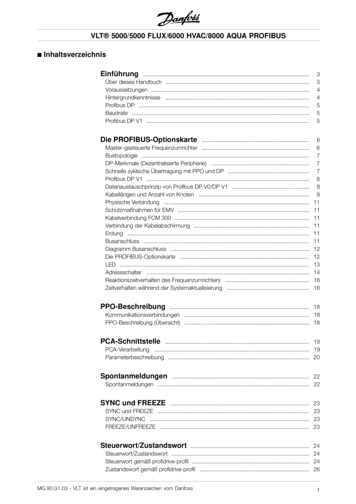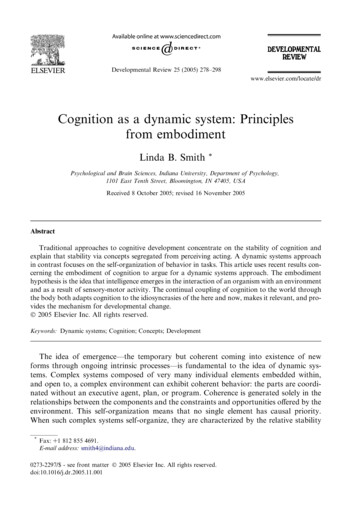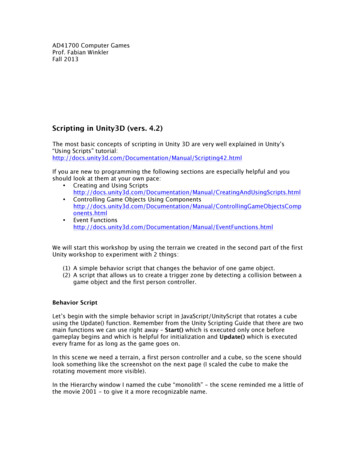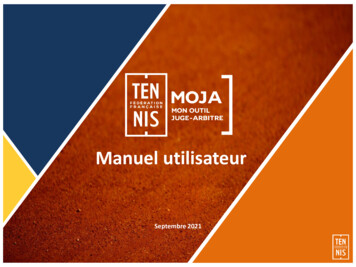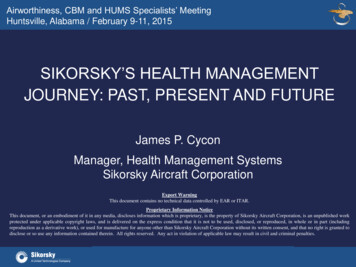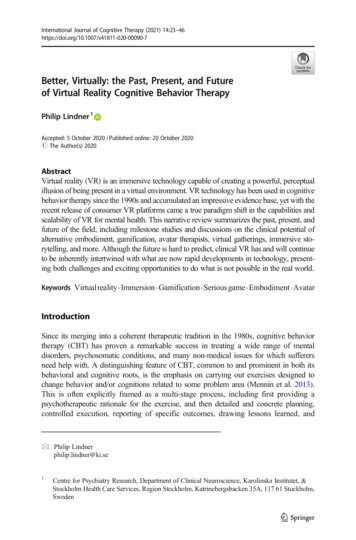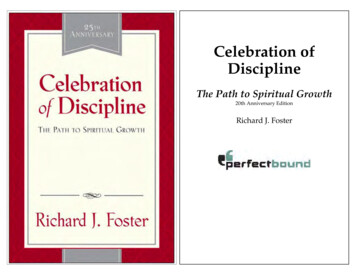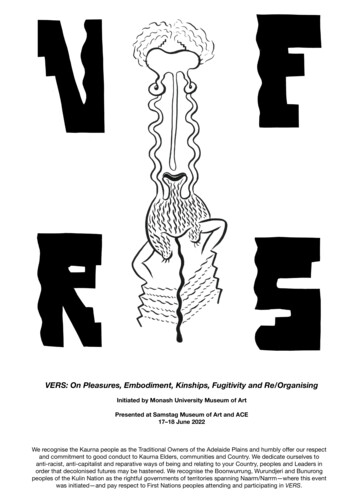
Transcription
VERS: On Pleasures, Embodiment, Kinships, Fugitivity and Re/OrganisingInitiated by Monash University Museum of ArtPresented at Samstag Museum of Art and ACE17–18 June 2022We recognise the Kaurna people as the Traditional Owners of the Adelaide Plains and humbly offer our respectand commitment to good conduct to Kaurna Elders, communities and Country. We dedicate ourselves toanti-racist, anti-capitalist and reparative ways of being and relating to your Country, peoples and Leaders inorder that decolonised futures may be hastened. We recognise the Boonwurrung, Wurundjeri and Bunurongpeoples of the Kulin Nation as the rightful governments of territories spanning Naarm/Narrm—where this eventwas initiated—and pay respect to First Nations peoples attending and participating in VERS.
VERS: On Pleasures, Embodiment, Kinships, Fugitivity and Re/OrganisingVersatility implies an ability to adapt or beadapted to different functions or activities.Its roots in language (versatilis, versare) holdmeanings of turning and movement: revolving,bending or swinging physically, being engaged,being able to turn to something with ease,freely. Versatility is also a sexual capacity:a lover whose sexual role, or mode, is notpredetermined, but dependent on the relationaldynamics of the encounter—top, bottom andotherwise. To be versatile—or vers—is tosign on to an agile, responsive and creativeprocess.VERS emerged from our conversations aboutcuratorial practices. Becoming and being vers,being able to turn, switch, shift, are capacitieswe associate with non-centred ways ofknowing the world. If we focus on this notion(and how and why people in the arts are vers),do we find new capacities for surviving andgrowing pleasure in our work? Is being vers aneoliberal or a fugitive mode? How do queer,trans, non-binary, Indigenous-gendered makersand organisers come together beyond thepurview of resilience and the roles assigned bydominant regimes of value?We invite rigorous conversation and debate,speculation and questioning as a way tounpack these ideas and the conditions wefind ourselves in. Be conscious of listening toeach other, giving space for each other andrespecting points of difference.A vers is only vers for others. We inviteeveryone to come and go freely during theevent.—Frances Barrett, Archie Barry,Maddee Clark, Léuli Eshrāghi, Jeff Khan andMelissa Ratliff (Curatorial Advisory Panel forVERS)For this program, arts workers, artists andcurators have been invited to a conversationthat attends to the topics of pleasures,embodiment, kinships, fugitivity and re/organising over the course of one afternoon.Performances and presentations taking placebefore and during the event contribute to thesetopics in ways not restricted to language. Therolling, roundtable conversation is intended toreflect on becoming and being vers throughthe lived experience of the invited attendants,whose work and practices reveal a plethora ofmodes of exchange.2/8
VERS: On Pleasures, Embodiment, Kinships, Fugitivity and Re/OrganisingProgramFriday 17 JuneSamstag6pmSamstag (Gallery 1)V Barratt, Brian Fuata and Daniel Jaber in conversation, moderatedby Frances BarrettSaturday 18 June*Samstag, ACE1pmSamstag (Gallery 1)Welcome to Country by Kaurna/Ngarrindjeri man Robert TaylorIntroduction by Curatorial Advisory PanelReading by Dominic GuerreraConversation on the themes of Pleasures, Embodiment, Kinships,Fugitivity and Re/Organising with attendants:Troy-Anthony BaylisAngela BaileyV BarrattSimona CastricumDebris Facility Pty LtdBrian FuataKyra Kum-SingNeika LehmanLiz MartinJazz MoneyBhenji RaNikki SullivanVerónica TelloEmma WebbThe attendants will participate in a responsive conversation thataddresses the themes of the day. Each attendant has the discretionto contribute as much or as little to each theme as they wish andhas been invited to consider a set of questions in relation to theirpractice or a specific project.IntermissionPerformance by Archie BarryConversation resumes5pmACE (Foyer)Performances bySione TeumohengaHarriet Fraser-BarbourClosing drinksSaturday’s program is being audio recorded and will be available as apodcast after the event.*Coinciding with VERS, Daniel Jaber’s living installation Rot takes place over73 hours between 18–20 June at Samstag (Gallery 2).3/8
VERS: On Pleasures, Embodiment, Kinships, Fugitivity and Re/OrganisingThemes and guiding questionsPleasuresKinshipsFinding joy in what we do—within ourselvesand with each other.Building relational infrastructures of support,care and intimacy. How can we initiate newecologies and non-extractive connections?I. What does pleasure mean for you?II. What or where is the pleasure in your work?III. What are the obstacles to pleasure?IV. Is pleasure a re/organising force?V. If we focus on the notion of vers—able toturn, switch, shift—do we find new capacitiesfor surviving and growing pleasure in our work?VI. Quarantined auto-eroticism has beenthe realm of meaningful touch during thepandemic. How could masturbation bedestigmatised/reconsidered as a practice ofself knowledge? Why does that already feelqueer?EmbodimentForegrounding embodied experience as amode of knowledge production. What are thelived realities of being in a body?I. What is kinship when not biological?II. What histories and ethics of kinship havebeen erased/delegitimised?III. How do queer, trans, non-binary, Indigenousgendered makers and organisers come togetherbeyond the purview of resilience and otherneoliberal ideologies invested in the foreverunder-remunerated worker?IV. What new kinship structures are necessary?V. Is friendship an infrastructure?VI. Is friendship possible within our currentlabour conditions? Is it a false economypropping up the arts?VII. When does kinship become nepotism?VIII. What is kinship in curating and/or arthistory?I. How do we think through and with bodies?II. Is the body as important to curators/organisers/historians as it is to artists?III. How do we think the body outside ofperformance practices?IV. Who has corporeal self-determination?V. What is a body in isolation? How have webeen co-regulating our central nervous systemduring isolation?VI. What isn’t a performance, when connectionincreasingly replicates an intimate form ofbeing looked upon (panopticon social media,unidirectional attention)? How does thishelp us understand Judith Butler’s notion of‘performativity’?VII. We are simultaneously the mostinterconnected and separated as we haveever been; how do we metabolise these‘dichotomies’?VIII. How do we make gender and sexualself-determination a possibility (or at least aconsideration) for all people?4/8
VERS: On Pleasures, Embodiment, Kinships, Fugitivity and Re/OrganisingFugitivityRe/OrganisingA mode that is not strictly oppositional butseeks a different position. What are our variousmodes of flight, opting out, shadowing orescape?Developing the conditions for doing thingsdifferently, where we replace, redistribute, queerthe systems that govern cultural production.I. What does it take to move beyond ourassigned roles into a plethora of modes ofexchange that are dignifying and realising whowe have always wanted to be?II. Do we need new spaces?III. What new ecologies of space are formingAC (after-COVID)? E.g., becoming mentallyattuned to distance, rent freeze, occupyingempty housing, ‘fluid-bonding’ mentalityIV. How do these relate to the ways that queer/trans people have historically created and foundcommunity? I.e. minor oral histories, socialcodes, the internet, the HIV/AIDS epidemic andits attendant histories of connection in isolation.V. Who and what is feeling limited by the artworld?VI. What roles can we let go of?VII. Power bottom and service top: where is theauthority? How do we play with power?VIII. What is an act of service as opposed toservitude?IX. Who do we want to serve and where do wefind grace and gratitude in the art world?X. How are we switching roles? E.g., steppingdown, offering opportunities, circulating capital(social, financial, resources), inviting others in,communicating across difference.XI. Where do things sit now—recentorganisational turns towards conditionsthat look like socialism (renationalisation ofcompanies) or nationalism (closed borders,regional production)XII. What role have community heritageorganisations (like the Australian QueerArchives) played in creating culturalrepresentations that more broadly reflectsociety?XIII. How do you queer a museum? Is it betterto keep heritage in community hands?XIV. Organising, re-organising, or burning downand starting over?I. Who has the choice to be invisible? Whobenefits from invisibility? Who suffers frominvisibility?II. How do we balance the need for access—visibility—with the desire for fugitivity?III. Why would someone choose to be lessrecognisable?IV. How to escape the idea that seeing isknowing? (David Getsy et al.)V. What histories of fugitivity can we learn moreabout? E.g., the underground railroad, queerabstraction, beats and cruising.VI. How do you recognise a queer space?VII. What is the potential in fugitivity in relationto the disciplining nature of institutionalcontexts?VIII. What happens when queer work movesfrom more subcultural and experimental socialworlds to institutional contexts?5/8
VERS: On Pleasures, Embodiment, Kinships, Fugitivity and Re/OrganisingBiographiesAngela Bailey is a curator, photographic artistand President of the Naarm/Narrm-basedAustralian Queer Archives.Harriet Fraser-Barbour is a Tarntanya/Adelaidebased multi-instrumentalist whose monikerMillenium Cowboy creates meditative, etherealsynth scapes.V Barratt is a trans-media artist, researcher,writer and performer living on Kaurna Yarta,Adelaide.Brian Fuata is a Samoan-Australian artist andimproviser living on Gadigal Country (Sydney).Troy-Anthony Baylis is a Queer-Aboriginalartist, curator and writer with Jawoyn (NorthernTerritory) and Irish ancestry living on KaurnaCountry.Dominic Guerrera is a Ngarrindjeri, Kaurna andItalian person. Dominic is a poet, podcaster andFirst Nations producer.Daniel Jaber is a dancer, choreographer andartist of Lebanese and Māori descent whoworks independently and with the AustralianDance Theatre on Kaurna Country.Frances Barrett is an artist and curatorliving on Kaurna Country and a lecturer incontemporary art at University of SouthAustralia.Jeff Khan is a curator, writer and ArtisticDirector and CEO of Performance Space,Sydney, on Gadigal Country.Archie Barry is an interdisciplinary artistcurrently living and working in Naarm(Melbourne).Kyra Kum-Sing is a Malera Bandjalan andMitakoodi woman, artist and curator workingat Boomalli Aboriginal Artists Co-operative onWangal/Gadigal lands.Simona Castricum is a multidisciplinarycreative, academic and broadcaster working inmusic and architecture on Wurundjeri land ofthe Kulin Nation.Neika Lehman is a writer, artist and memberof this mob collective who descends from theTrawlwoolway peoples of tebrakunna Country,lutruwita.Maddee Clark is a Kombumerri/Yugambehwriter, editor and researcher residing betweenNaarm, on the lands of the Wurundjeri andBoonwurrung, and Rubibi (Broome) on Yawurucountry.Liz Martin is an arts and disability advocate,award-winning musician and CEO of AccessibleArts, the peak arts and disability organisation inNew South Wales.Debris Facility Pty Ltd is a para-corporateentity foundead in 2015 and institutionallyaffiliated with Liquid Architecture and theVictorian College of the Arts.Léuli Eshrāghi is a Sāmoan/Persian/Cantoneseartist, writer, curator and researcher workingbetween Australia and Canada. Eshrāghi isCurator of the 9th TarraWarra Biennial in 2023and Curatorial Researcher in Residence at theUniversity of Queensland Art Museum.Jazz Money is a poet and artist of Wiradjuriheritage, currently based on sovereign Gadigalland.Bhenji Ra is a trans femme Filipinxinterdisciplinary artist who makes collaborativeperformance work with Warrang/Sydney-basedcollective Club Ate and is the mother of WesternSydney based collective and ballroom houseSLÉ.6/8
VERS: On Pleasures, Embodiment, Kinships, Fugitivity and Re/OrganisingStaff and supportMelissa Ratliff is Curator Research at MonashUniversity Museum of Art (MUMA) in Naarm/Narrm.Dr Nikki Sullivan is a Project Coordinator atSAMESH, an Adjunct Associate Professor atthe University of South Australia andco-author of Queering the Museum (Routledge,2020).Dr Verónica Tello is a Chilean-Australian arthistorian and writer based at UNSW Art &Design, Sydney.Sione Teumohenga is an artist and musicianbest known for their pop-oriented music withexperimental production influences, createdunder the moniker Lonelyspeck.Emma Webb is Director of Vitalstatistix, basedin Port Adelaide, South Australia.MUMAHannah Mathews, Senior CuratorMelissa Ratliff, Curator ResearchWarisa Somsuphangsri, CommunicationsSamstag Museum of ArtErica Green, DirectorGillian Brown, CuratorEmily Clinton, Curatorial AssistantTeresa Busutil, Public Programs CoordinatorACEPatrice Sharkey, Artistic DirectorGrace Marlow, Public Programs CoordinatorCurator performancesFrances BarrettVERS identityHana ShimadaAuslan interpretationThe Deaf Butterfly EffectAudio setup, technical support and recordingMosaic Audio VisualPodcast editing and productionTilly Balding, Solstice PodcastingThis project was commissioned by MonashUniversity Museum of Art and presented on siteand in association with Samstag Museum of Artand ACE.It has been supported by the City of Adelaide.7/8
VERS: On Pleasures, Embodiment, Kinships, Fugitivity and Re/OrganisingVenues/AccessThis is an Auslan interpreted event. SamstagMuseum of Art and ACE are located in thewest of the city within 400m of each other andare accessible by wheelchair and pram. Bothvenues have accessible toilets.Samstag Museum of Art55 North Terrace, AdelaideUniversity of South Australia City West campusCorner of Fenn Place and North TerraceAccess: Entry ground floor Hawke Building.Galleries over 2 floors, lift and stair accessACELion Arts Centre, North Terrace, AdelaideEntry from either North Terrace or MorphettStreetAccess: Access ramp in front of neighbouringJamFactory. Venue on one levelArrive by:Free city trams (exit at the City West stop, 100mfrom Samstag, 70m from ACE)Adelaide Railway Station (10 minute walk or600m from Samstag and ACE)Bus (the closest bus stop is X1 North Terrace;various Grenfell Street bus stops nearby)Bike (bicycle parking on Morphett Street at theLion Arts Centre precinct entrance, in front ofJamFactory and Mercury Cinema)Car (Samstag has 4 access car spots directlyout the front; ACE has an access spot locatedat the Lion Arts Centre’s Morphett Streetentrance; limited amount of ticketed on-streetparking; Wilson Parking located one block awayon the corner of Hindley Street and ClarendonStreet; other commercial car parks located onHindley Street)8/8
II. What or where is the pleasure in your work? III. What are the obstacles to pleasure? IV. Is pleasure a re/organising force? V. If we focus on the notion of vers—able to turn, switch, shift—do we find new capacities for surviving and growing pleasure in our work? VI. Quarantined auto-eroticism has been the realm of meaningful touch .
